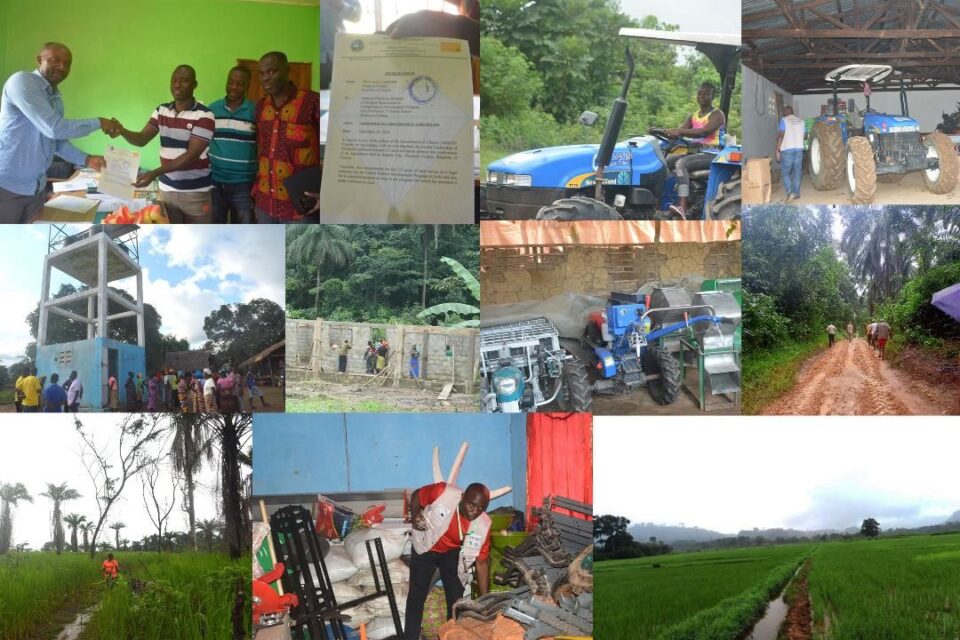Monrovia, Liberia–Farmer Cooperatives supported by the government-funded Accelerated Community Development Programme (ACDP), implemented, and managed by UNDP, are excited about engaging in commercial swamp rice and cassava production/cultivation, the UNDP said here this week.
During a one-week intensive joint monitoring mission, UNDP led a team from the Ministries of Finance and Development Planning, Agriculture, and Internal Affairs to engage farmers on progress made thus far with support from the project.
“We now know the value of swamp rice production and assure you that in the next few months, this cooperative will be ready to feed Nimba County,” said the Dokodan Farmers’ Cooperative Leadership in Gbedin.
The Chairperson and Secretary-General Norhn Wilson and William Larpeh said the cooperative initially certificated by the Cooperative Development Agency (CDA) with its governance structure in place had been dormant for over seven years until the ACDP launched in 2022, encouraged them to get back on board.
“Since the reactivation of the cooperative and with the logistical, financial, and capacity-building support provided by the ACDP, our farmers have been busy in the swamps cultivating low-land rice,” said Madam Norhn and Mr. Larpeh.
The ACDP is supporting start-ups of over 50 farmers formed into fourteen cooperatives selected from Bomi, Gbarpolu, Nimba, Rivercess, Lofa, and Bong to take steps toward reducing poverty through agriculture, and other socio-economic activities. The aim is to help them embrace mechanized farming moving away from subsistence farming.
In Rivercess County, the Tompoe Agricultural Development Cooperative leadership in Tompoe Village in Yarpah District was ecstatic about the support provided by the project.
“For us in this County, this is the first time in our history that we have had such initiative. We are standing by to provide more land for our swamp rice cultivation and any other activity that benefits the people of this County,” said Elder Brown and the Chairman of the cooperative David Gbateah.
“We also during the two-year project, took steps to purchase more locally sourced rice and vegetable oil through our Liberian suppliers as part of our ongoing commitment to use local ingredients wherever possible with full support from USAID,” she said
According to Mary’s Meals Country Director, they will continue to play a part in supporting Liberia farmers by sourcing as much food as possible locally and maintaining a school feeding program in Liberia.
“Thanks to the support of the American people and the dedication of local communities who volunteer their time to run the program, we have continued to address the immediate needs of children who are facing food insecurity while also supporting them to access education”
She explained that by promoting access to education and improving children’s readiness to learn, their work with USAID has contributed to long-term benefits for Liberian children and their community.
She observed that the success of the project is a powerful reminder of what they can achieve when they come together with a shared purpose.
Madam Naweocki noted that they will continue to rely on close, collaborative partnerships with communities, Individuals, and organizations who share their values, vision, and hopes for the future.
“While this program has come to an end today, I am confident that its impact will be felt for years to come. Mary’s Meals remains committed to its promise to provide a daily meal in a place of education for children who need it most and we will continue to support the 45,000 who were part of this project as well as the other learners in our program which is about 100,000 children in all while seeking out additional resources to able to reach the next child waiting” She ended.
In remarks, USAID Liberia Acting Mission Director Rory Donohoe commended all partners for the initiative and the successful implementation.
According to Donohoe, the program was not just about celebrating the end but celebrating the partnership together with USAID and Mary’s Meals Liberia.
He used to occasion thank the government, teachers, and the communities for their unwavering support in ensuring that children’s education is achieved.
In a heart-warming address at Kpallah Public School, Sona T. Sesay, Assistant Minister for Student Personnel Services of the Ministry of Education, underscored the transformative role of the USAID and Mary’s Meals School Feeding Program in Liberia.
Addressing a gathering of distinguished guests including representatives from USAID, Mary’s Meals, and the other partners, Minister Sesay expressed gratitude for their unwavering commitment to enhancing the lives of Liberia’s children.
“The program we celebrate today is a testament to the power of partnership in overcoming the challenges our students face in accessing quality education,” he remarked.
Beyond simply alleviating hunger, the program has become a vital pillar of educational success and community empowerment.
“For many of our students, these meals represent hope and opportunity, enabling them to stay in school and improve academically,” said Minister Sesay.
The initiative has notably contributed to increased enrollment rates and reduced absenteeism, with well-nourished children showing improved concentration in their studies.
He said the program aligns with the Ministry’s goal of fostering an environment conducive to foundational learning.
Assistant Education Minister Sesay highlighted the ongoing collaboration between USAID, Mary’s Meals, and the Ministry of Education as a remarkable example of effective partnership.
“Under my leadership at the Bureau of Student Personnel Services, we are committed to expanding these vital initiatives and ensuring that no child in Liberia has to choose between hunger and education,” he stated.
As the event concluded, Minister Sesay reiterated the Ministry of Education’s dedication to sustaining these efforts, emphasizing that when children are well-fed and educated, they possess the potential to uplift their families, communities, and the nation.
She expressed hope for further collaborations to enhance educational access and quality for all Liberian children.
The gathering celebrated not only the successes of the school feeding program but also the path ahead, as stakeholders remain committed to ensuring that every child in Liberia can thrive without the burden of hunger.

